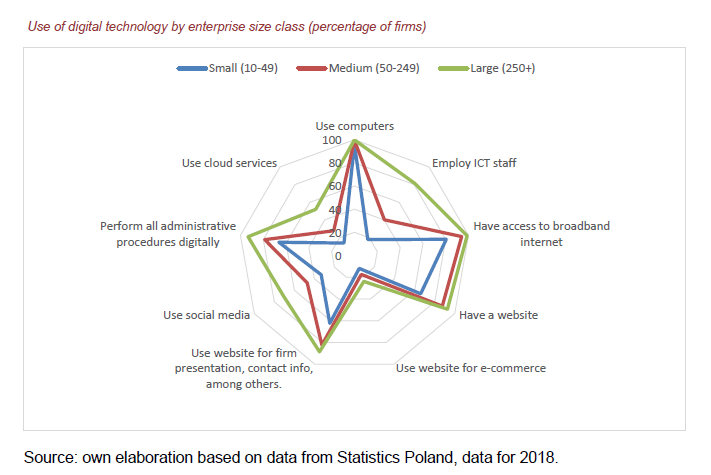REPORT "Digitalisation of Poland's post-COVID economy – how to make the best use of the EU Recovery Fund?"
In this report, we show that the level of digitalisation of the Polish economy as a whole is behind European benchmarks and that it is insufficient. This has two dimensions – one is the overall low digital literacy of Polish society and the low demand for digital services, while the other is the insufficient digitalisation of business activities which stems from inefficient programmes and incentives in this respect. These dimensions overlap – human capital deficiencies reduce the benefits from digitalisation efforts on the part of enterprises while digitalisation itself is performed in an inefficient way.
We analyse digitisation in several sectoral dimensions to understand the challenges facing specific segments of the Polish economy. We show that the deficiencies in digitalisation are uneven: small firms are lagging behind large firms, while manufacturing firms use existing digital solutions in inefficient ways, lacking integration and strategic vision. Given the existing empirical evidence, improvements in these areas can positively contribute to the costs of running a business and to the way a business is organised as well as improve the allocative efficiency. Improving the degree of the use of digital technology in manufacturing can contribute to maintaining the cost-competitiveness of the sector while digital process innovations can shift it towards non-price competitiveness. Improvements in the digitisation (and digitalisation) of the services sector will help with consumer outreach and facilitate entering foreign markets, in particular for small firms.

Last but not least, in light of the identified list of needed improvements, we comment on the potential use of the EU Recovery Fund which was agreed in July 2020 to mitigate the social and economic damage of the COVID-19 pandemic in EU MS. Thanks to this earmarked budget, the European Commission (EC) will be able to borrow EUR 750 billion from capital markets and redistribute it among MS as grants and loans between 2021 and 2027.
Authors: Jan Hagemejer, Karolina Zubel
This report has been co-financed by the European Commission Representation in Poland. The European Commission, or any person acting on its behalf, is not responsible for the use of the information contained in this report. This report reflects the views only of the authors, and the European Commission cannot be held responsible for any use which may be made of the information contained therein.


